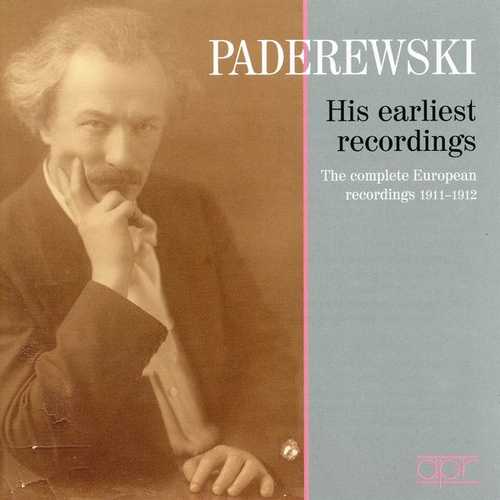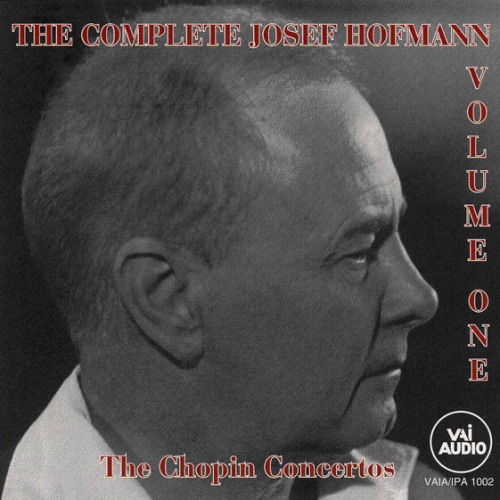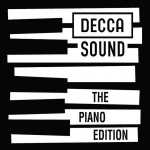
Composer: Frédéric François Chopin, Claude Achille Debussy, Ferencz Liszt, Felix Mendelssohn, Ignacy Jan Paderewski, Niccolò Paganini, Anton Rubinstein, Franz Peter Schubert, Robert Schumann, Zygmunt Denis Antoni Stojowski
Performer: Ignace Jan Paderewsk
Format: FLAC (tracks)
Label: APR
Catalogue: APR6006
Release: 2008
Size: 392 MB
Recovery: +3%
Scan: yes
CD 01
Chopin: Waltz in A-Flat Major, Op. 34
01. No. 1 “Valse brillante”
Chopin: Nocturne in F-Sharp Major, Op. 15
02. No. 2
Chopin: Waltz in C-Sharp Minor, Op. 64
03. No. 2
Stojowski: 4 Pièces, Op. 26
04. No. 3, Chant d’amour
Liszt: 12 Lieder von Schubert, S. 558
05. No. 9, Ständchen (Horch, horch! Die Lerch!)
Schumann: Nachtstucke, Op. 23
06. No. 4, Ad libitum – Einfach (Rundgesang mit Solostimmen)
Chopin: Polonaise No. 3 in A Major, Op. 40
07. No. 1 “Military”
Chopin: Nocturne in E major, Op. 62
08. No. 2
Chopin: Étude in G-Flat Major, Op. 25
09. No. 9 “Butterfly’s Wings”
Chopin: Étude in F Major, Op. 25
10. No. 3 “Horseman”
Chopin: Mazurka in A Minor, Op. 17
11. No. 4
Chopin: Nocturne in F major, Op. 15
12. No. 1
Paderewski: 6 Humoresques de concert, Op. 14, Book 1 “À l’antique”
13. No. 1, Menuet célèbre in G Major
Paderewski: Miscellanea, Op. 16
14. No. 4, Nocturne in B-Flat Major
Mendelssohn: Lieder ohne Worte, Book 4, Op. 53
15. No. 4 in F Major, MWV U114
Mendelssohn: Lieder ohne worte, Op. 19b
16. No. 3 in A Major, MWV U89 “Jägerlied”
Debussy: Images, Book 1, L. 110
17. No. 1, Reflets dans l’eau
Liszt: Grandes études de Paganini, S. 141
18. No. 3 in G-Sharp Minor “La campanella”
Paderewski: 6 Humoresques de concert, Op. 14, Book 1 “À l’antique”
19. No. 6, Cracovienne fantastique
Chopin: Nocturne in F-Sharp Major, Op. 15
20. No. 2
CD 02
Chopin: Étude in C Minor, Op. 10
01. No. 12 “Revolutionary”
Chopin: Étude in C Major, Op. 10
02. No. 7 “Toccata”
Chopin: Étude in A-Flat Major, Op. 25
03. No. 1 “Harp Study”
Chopin: Étude in F Minor, Op. 25
04. No. 2 “Bees”
Chopin: Étude in E Major, Op. 10
05. No. 3 “Tristesse”
Paderewski: 6 Humoresques de concert, Op. 14, Book 1 “À l’antique”
06. No. 6, Cracovienne fantastique
Liszt: 12 Lieder von Schubert, S. 558
07. No. 9, Ständchen (Horch, horch! Die Lerch!)
Schumann: Fantasiestücke, op. 12
08. No. 1, Des Abends
09. No. 2, Aufschwung
10. No. 3, Warum?
Chopin: Waltz in A-Flat Major, Op. 34
11. No. 1 “Valse brillante”
Chopin: Mazurka in A Minor, Op. 17
12. No. 4
Liszt: 6 Chants polonais, S. 480
13. No. 1, Mädchens Wunsch (After F. Chopin)
Chopin: Étude in C-Sharp Minor, Op. 25
14. No. 7 “Cello”
Liszt: Grandes études de Paganini, S. 141
15. No. 3 in G-Sharp Minor “La campanella”
Stojowski: 4 Pièces, Op. 26
16. No. 3, Chant d’amour
Liszt: 3 Études de Concert, S. 144
17. No. 2 in F Minor “La Leggierezza”
Liszt: 6 Chants polonais, S. 480
18. No. 1, Mädchens Wunsch (After F. Chopin)
19. Chopin: Berceuse in D-Flat Major, Op. 57
Mendelssohn: Lieder ohne worte, Op. 19b
20. No. 3 in A Major, MWV U89 “Jägerlied”
21. Rubinstein: Valse-caprice in E-Flat Major
Paderewski was perhaps the most famous, and certainly the most highly paid, pianist who ever lived. In the years between 1890 and the First World War his fame reached levels now only reserved for the biggest pop stars and when he became prime-minister of Poland after the end of the war his deification was complete. He resumed his career in the 1920’s and continued to perform until his death. Unfortunately most of his recordings were made later in life and do not capture his playing in its prime, a fact which has somewhat damaged his posthumous reputation, so it is particularly important that these earliest recordings, which can redress the balance, are made available complete for the first time. This is playing very different in style from what we are used to today, but aside from its historic importance, taken on its own terms it is quite clear what a great communicator Padereswki was. And it’s good to be reminded in works like Liszt’s La Leggierezza study that at this point in his career there was nothing lacking in technique either.
Several titles included are taken from Paderewski’s own test pressings of unissued discs held at the International Piano Archive, University of Maryland, and this is their first release. A must for collectors!
Polish pianist and composer Ignace Jan Paderewski was, in his time, considered a titan in both of these roles. At one time, everyone who played a piano knew his Minuet in G, Op. 14/1, and when Popeye the Sailor wanted to demonstrate how spinach was capable of making him play like a great pianist, Paderewski’s was the name invoked. During the better part of his lifetime, everyone, even children, knew who Padrewski was. Apart from music, Paderewski was renowned for his humanitarian efforts and regarded as a world leader; in his capacity as the first prime minister of a free Poland, he was a signatory to the Treaty of Versailles. American President Franklin D. Roosevelt once referred to Paderewski as a “modern immortal.” Yet modern notions of what constitutes “good” pianism — or at least the views held by many experts on the subject — have generally not been kind to Paderewski. His forceful, aggressive, and somewhat imprecise manner of interpretation, particularly apparent in his better circulated later recordings, has been singled out for critical scorn far more often than praise. Harold C. Schoenberg’s 1963 verdict on Paderewski’s recordings and piano rolls was that “his playing must have been utterly impossible.”
Although he started rather late — not until he was 50 — Paderewski left an extraordinary legacy of recordings, more in quantity than any other pianist born in the 1860s. As a general rule, earlier is better than later, and APR has collected, for the first time anywhere, every surviving selection Paderewski made in the first two years of his recording activity in Paderewski: His Earliest Recordings. When Paderewski finally deigned to make records in 1911, it was on the condition that he would only do so on the grounds of his estate in Morges, Switzerland. Therefore, the Gramophone Company trotted out to Morges with its primitive acoustic equipment; in 1912, and Paderewski followed this up with proper studio sessions in Paris and London. Although only six sides were issued from the first session, Paderewski saved test pressings of most of the selections made, and 15 Swiss-made Paderewski recordings are included, four of them never before made public. Another three among the remaining selections are previously unheard in this generous two-disc selection containing 41 Paderewski performances in all.
APR brought in a first-class team to prepare the release: annotator Donald Manildi, who heads the International Piano Archive in Maryland, and transfer engineer Seth B. Winner, regarded by many as the best in the business in handling recordings of this vintage. As Paderewski hated making records and was never satisfied with his performances, he remade many of these recordings over the years rather than keep the older ones in print, and as a result, these earlier records are extremely rare; certainly, the unissued items survive in one copy only. Sound is quite variable owing to wear and tear on the originals, and certain tracks are dimmer than others. Some come through with amazing fidelity, such as the Chopin Polonaise in A, Op. 53/1, and “Butterfly Etude” from the 1911 session. The Paris session is remarkable as Paderewski was in especially good voice that day. He recorded, in addition to marvelous readings of Mendelssohn’s “Hunting Song” and Liszt’s “La Campanella,” Debussy’s “Reflets dans l’eau” marked out in a distinctly nineteenth century style and sense of touch.
Regrettably, Paderewski never recorded concerti or other major literature. Although prime examples of Paderewski’s playing may be found scattered throughout all of the periods of his nine or ten hours of recordings, they are decidedly less numerous as time progresses. Therefore, the period systematically represented by APR’s Paderewski: His Earliest Recordings both demonstrates this legendary pianist in the highest concentration of his glory and helps restore something of his battered reputation.



